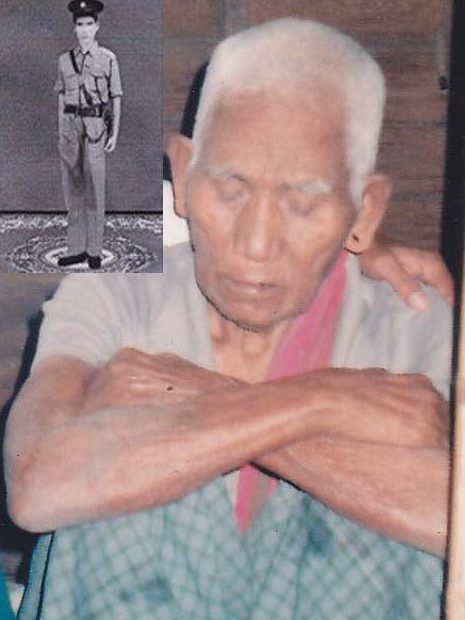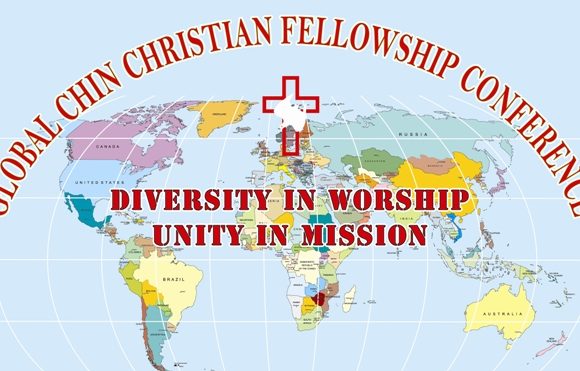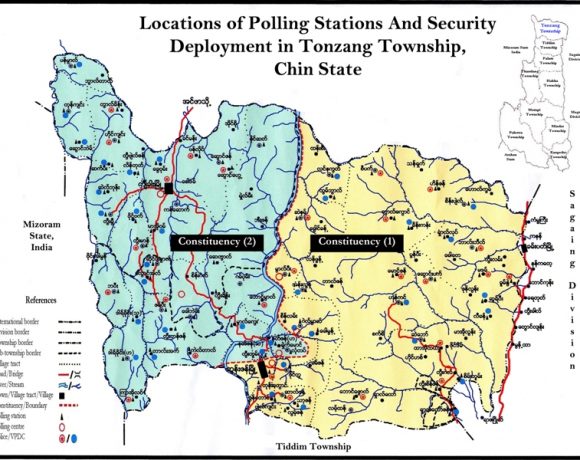Unheard Chin Hero U Kee Paing, General Aung San’s Comrade Passed Away In Kanpetlet

23 January 2010 (Chinland Guardian): One of the comrades of Burma’s Independence father General Aung San, U Kee Paing, also known as U Maung Gyi, of a Dai-Chin tribe, passed away at the age of 91 in his native place on 1 January 2010. He was peacefully laid to rest in a Christian cemetery in Kanpetlet Town, southern Chin State of Burma on 3 January 2010.
Born on 12 August 1919 as the only child to U Paing Ling and Daw Hlu Hung at Phung-Im village, Kha-Yaing Circuit, Kanpetlet Township, U Kee Paing belonged to the Shenpängthon clan of Dai-Chin tribes.
After studying at a Buddhist Monastery of Kyindwe village from 1933 to 1936, U Kee Paing was one of the leaders being actively involved politically in the struggle for independence in Burma between 1937 and 1941 in Kanpetlet. Alongside former Chin Affairs Minister Pu Vomtu Mawng and Bo Kyaw Oo (U Kyaw Oo), he bravely protested and demonstrated against the British colonial rule on 20 January 1941 at Dabar, Kanpetlet District. After that, he decided to join the Burma Army to fight for the independence.
He joined the BIA – Burma Independence Army (later known as BNA – Burma National Army) in Pyinmana on 1 December 1942 as a rifleman of Platoon 1 within Battalion 4. U Kee Paing joined Regional Battalion 7 based in Thayet soon after recovering from a slight injury on his right leg during the British Air bombardment of Pyinmana, and was later promoted to a rank of BNA Corporal until October 1945.
In 1946, General Aung San sent Bo Maung Kalay (U Maung Kalay) on his behalf to the Southern Chinland for the purpose of Chin-Bamar friendship mission. Corporal Kee Paing accompanied U Maung Kalay throughout his Chin-Bamar friendship mission preparation and fact finding trips to Mindat, Kanpetlet and Paletwa Townships. U Kee Paing spoke to the southern Chin people about the necessity of unity, development, education, health, civilisation, becoming apart of Burma mainland and fighting for a complete Burma Independence from the British colonial rule.
He was also one of a few leaders that led a Chin delegation to attend the historical Chin-Bamar Chitkyiyay Nyilarkhan (Chin-Bamar Friendship Conference) held in Thilin town, Pakokku District, Magway Division on 4-6 March 1947. The Conference was held under the leadership of Chin leader Pu Vomtu Mawng, and Deedoke U Ba Cho, Bamar leader.
Furthermore, he saw the urgency of joining the Union Military Police (UMP) to fight the oppositions and fractions that undermined the newly Burma’s Independence. He was an officer of Platoon 5 within Battalion 14 under Major (Bohmoo) Ha Shing. The Battalion 14 took responsibility to fight against the oppositions, fractions and multi-colour arm groups in Pakokku Region, the West Bank of Irrawaddy River. U Kee Paing served for the UMP from 1948 to1961.
Whilst he was an officer of the UMP in the Pakokku Region, one reason arose for the need of change in his career again. It fell upon him wholly because of his faithfulness, sincerity, honesty, dutiful spirit, hard working mentality and love for his work. Then he was always getting attention from his officers. Therefore, he was once chosen to be a bodyguard of Pu Shing Thang, Chin Affairs Minister for four years from 1956 to1959.
After four years, Chin Affairs Minister Pu Shing Thang requested him to take a position of Police officer in charge of Police Force in Kanpetlet for two years from1960 to1961. One of his duties was to train new policemen in the southern Chin towns in Mindat and Kanpetlet Townships. He was praised as an excellent and outstanding Police Officer.
In 1983, U Kee Paing retired as a pensioner after working for the Department of Agriculture in Kanpetlet since 1962.
For his determined, courageous, loyal services and achievements as a citizen, he was presented a number of prestigious medals and outstanding awards:
- Lutlat-yay Mawgunwin Pahtamah Ah-sint (First class Independence Record Medal)
- Ayaytawpung Taseik (Revolutionary Medal)
- Lutlatyay Siyunghmuh Taseik (Independence Struggle Medal)
- Lutmyaukyay Taseik (Freedom Medal)
- Myochit Tatmataw Ayaytawpung Gunghtoosaung Lethmat (Burma National Army Resistance Outstanding Award), conferred by Sitthaynar Padigyoke Bogyoke Aung San (Chief-in-Commander General Aung San)
- Bamah Tatmataw Gunghtoosaung Lethmat (Burma National Army Outstanding Award) conferred by Commander of Battalion 7 Bohmoo Aung (Major Aung).
- Phetsit Tawhlanyay Ayaytawpung Gunghtoosaung Lethmat (Anti-Fascist Resistance Outstanding Award), conferred by Commander of Battalion Bohmoo Ye Htut (Major Ye Htut).
- Phetsit Tawhlanyay Ayaytawpung Gunghtoosaung Lethmat (Anti-Fascist Resistance Outstanding Award), conferred by Commander of Battalion 6 Bohmoo Ba Htoo (Major Ba Htoo).
- Phetsit Tawhlanyay Ayatawpung Gunghtoosaung Lethmat (Anti-Fascist Resistance Outstanding Award), conferred by Commander of Battalion 7 Dutiyah Bohmoo Gyi Bo Balah (Lt. Col. Bo Balah).
According to a personal interview conducted in 2006 by one reporter, U Kee Paing mentioned that he used to carry and pass the love letters of Aung San to Khin Kyi when they were in a brief courtship before their marriage. He also mentioned that he was once a bodyguard of Aung San. Further, he recalled his babysitting a few times whilst Daw Khin Kyi was on duty as a nurse at the Rangoon General Hospital
Another eyewitness, whose name is kept anonymous for security reasons, describes U Kee Paing’s willingness to greet Daw Aung San Suu Kyi during her last trip to Kanpetlet in southern Chin State just before the Depeyin Massacre in May 2003. It was reportedly claimed that Daw Aung San Suu Kyi asked for U Kee Paing but the two didn’t happen to meet not only because he had been blind since 2001 but also because Daw Aung San Suu Kyi had only one-hour speaking time to the Chin people.
U Kee Paing married twice, having no children with his first wife, Daw Pam Hleih. Later, he had two daughters and one son from his second marriage with wife Daw Len Kee. He was a Buddhist when he was in the BNA, UMP, Police and Agriculture Department. He converted to Christianity as a normal believer after his retirement in 1983 and finally became a born-again believer in 2001.
Before and after Burma’s independence, U Kee Paing selflessly served his beloved country, sacrificing his youth and energy, and using all his knowledge. Unfortunately, his dedicated services and contributions had been ignored and neglected by the military junta and he was left alone in his native village without any recognition and support during his difficult times as a blind man for nearly 10 years. He deserved a better care and assistance. Yet he never complained about the authorities. Though he was poor, he died with dignity and in peace. The SPDC should be ashamed of themselves for their negligence and ignorance over Burma’s unheard national heroes like U Kee Paing.
We, the Chins, should remember one of our unsung heroes forever. His name ‘U Kee Paing’ shall be written in the history of Burma and Chin for all times. He will indeed be remembered as one of the greatest high-flying hornbills from Chinland.
[Source: Kee Paing (Pyi Khaing Phyo), Tawhlanyay Yebaw Ei Bawah Hmattanmyar (A life story Record of a Burma Resistance Comrade) – 100th Years of Kanpetlet Town Magazine. Kanpetlet: Township Literature and Culture Committee, 1999. pp. 134-135.[
Collected and written by Shwekey Hoipang
[email protected]






